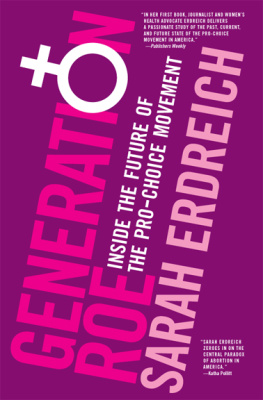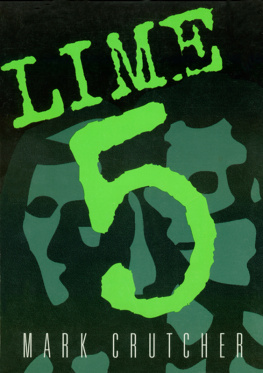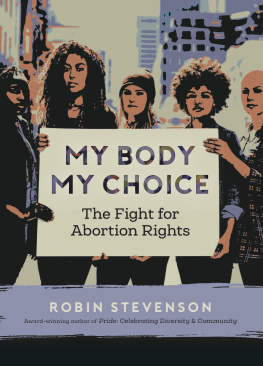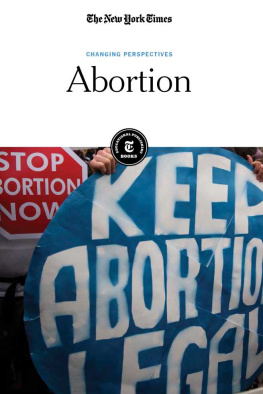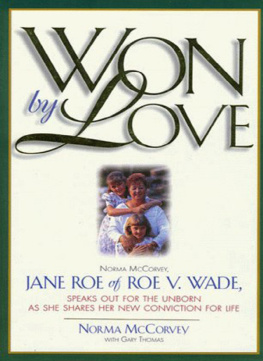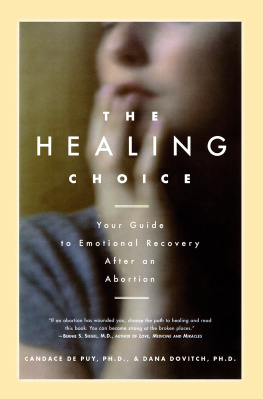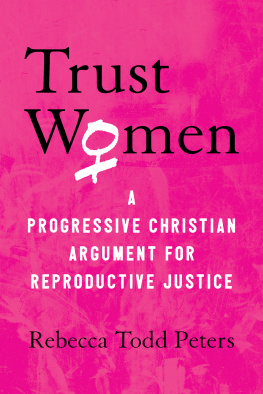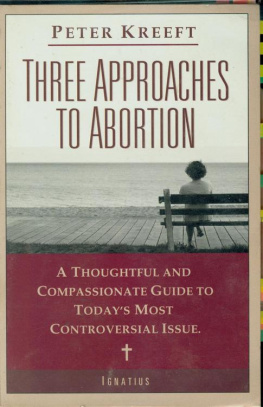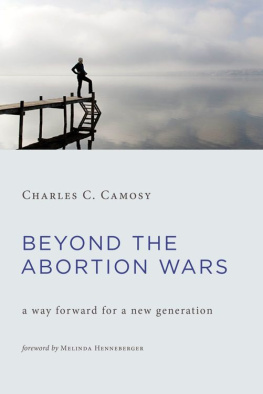Womens health advocate and writer Sarah Erdreich has been identified as a leading pro-choice activist by Newsweek , and her incisive writings on abortion rights have been noted by Jezebel , Feministing , and the National Partnership for Women & Families. She has worked for several prominent pro-choice organizations and has been published in On The Issues , Lilith , Feminists For Choice , and RH Reality Check . She has also worked editorially with the magazines HUES and Teen Voices . Generation Roe is her first book.
CHAPTER I
ABORTION IS NOT A FOUR-LETTER WORD
I am not a Nazi.
That is not a statement I ever thought Id have to make, particularly as a Jewish woman. But if there is one thing that anti-choice activists love more than ultrasound images of fully-formed and healthy fetuses, it is equating pro-choice beliefs with Nazism. The person who called me a Nazi in a particularly nasty e-mail has no idea where I spend my days or what I look like. Others who work to protect abortion rights cannot enjoy the safety of anonymity. Luckily for me, his hatred can take no expression greater than a viral insultone that I never want to read again, yet one that I save because it means something: it means that I cant give up.
Each pro-choice activist and abortion provider has his or her own reasons for pursuing this stigmatized work, which carries a very real threat of harassment and violence. My own reasons stem from a deep-seated desire to safeguard womens rights. Im unwilling to stand by as a passive witness as womens rights are chipped away to the point where abortion becomes, effectively, illegal. Im reminded of why this is important every time I meet a woman whose life was directly impacted by this larger struggle, such as when Renee Chelian, the founder and director of several abortion clinics in the Detroit area, tells me about the abortion she had as a fifteen-year-old in 1966.
My mom was six months pregnant with my younger sister, so it was my dad that took me, she recalls about the procedure, which cost $2,000a substantial sum today, never mind over forty years ago. We went to a parking lot near a building; we were put in the back of a car and I remember I couldnt see where we were going because we were blindfolded, so I couldnt look out the windows. We were driven into a warehouse; it was probably a garage. There was oil spilled on the cement floor and a card table, and there were a lot of women. I was afraid if I looked up and I said anything they wouldnt give me my abortion. They gave me something, thankfully, and when I woke up my dad took me home. After my abortion my dad told me well never ever talk about this again, no one [will] ever marry you if they know, and we cant risk anybody going to jail. And we didnt talk about it, really, for I cant even think how many years. When I opened the clinic, she adds, my parents were very, very proud of me, very, very supportive.
As harrowing as that experience must have been, Renee was fortunate not only to have her parents support but also not to have suffered any adverse effects following an illegal procedure. June Ayers, the director of Reproductive Health Services in Montgomery, Alabama, recalls a much more dangerous environment in her hometown. Before there was Roe v. Wade , [women] knew what abortion was like when you had to stand on a street corner with your money in hand and be willing to be blindfolded, then taken to God-knows-where to have it completed on someones kitchen table or wherever, she tells me as we sit in a small office in
And women did die from illegal abortion in the years before Roe : In 1930, it was the cause of death for almost 2,700 women, or 18 percent of maternal deaths recorded that year. By 1965, the number had declined to just under 200, but that still accounted for 17 percent of all childbirth- and pregnancy-related deaths that year.
Like June, Emily Lyons, a nurse who was seriously injured when Birminghams New Woman, All Women Healthcare Clinic was bombed in 1998, grew up in a small southern town. [I] came from a very strict Baptist house, didnt watch TV, didnt listen to music, didnt read a newspaper, she recalls as we sit at her dining room table. Civil rights and all that, it happened when I was growing up, but not in my house. We didnt talk about anything. How I turned out like this is beyond me. While she doesnt mention any experience with illegal abortion, Emily does bring up a particular case she worked on early in her nursing career.
When I was in school, my last semester was in labor and delivery. One of my patients was a saline abortion. They really just sent her off, she did her thing, I didnt have to monitor too much of anything except for her, and once she delivered in the bed, then you cleaned up, weighed it, and et cetera. When I look back now I think man, she must have felt so alone. I think that kind of got things started. That was 77, so abortion had been legal for four years. Obviously, her doctor decided this was what she needed to do; this was what she wanted to do. Whether its at four weeks or however many weeks on up, its still your decision to make; its a choice just like everything else in the world. Everything is a choice. You know people say its not a choice, its a child. No, it is a choice; it is a decision that you have to make.
Im reading a book now, Emily continues, The Girls Who Went Away . Talk about being ostracized. Its all the girls fault, of course, whisked off in the middle of the night to these homes [for unwed mothers]. Golly, when did society get so judgmental?
Hundreds of miles away, Robert Blake, a professor emeritus at the University of Missouris School of Medicine, e-mails me about his involvement in the pre- Roe pro-choice movement when he was a medical student in St. Louis.
A group of folks, including physicians, medical students, other health professionals and health professional students, and clergy was formed in the late 1960s in St. Louis to assist women in obtaining safe abortions at a time when abortion in Missouri was only legally available to save a womans life. Several OB/GYN physicians were willing to perform the procedure for women referred through this group. I dont know who they were, and I dont know how women found out about the groupprobably through clergy, counselors, etc. The role of the students was to meet with women one-on-one and counsel them. This involved informing them of
I counseled a few women. One I particularly remember was a married graduate student who could not afford a child. She was well educated and emotionally well adjusted with a supportive husband. In fact she and her husband seemed to be very similar to my wife and me, except she was pregnant and did not want to be. I think this experience dispelled some misconceptions I had about women who sought abortion. My stereotype was that they often had significant psychological problems and were immature. I discovered that this was not valid.
The world that Robert, June, Emily, and Renee grew up in is very different from the one that young activists and providers work in today. Not only did everyone born in or after 1973 grow up with legal abortion, but todays medical students, law students, and activists just entering the reproductive rights field came of age during the heyday of abstinence-only education, and in a time that has seen impressive gains by the anti-choice movement to restrict abortion access. They are in an interesting position, then: while they only know a world with legal abortion, they also only know a world where abortion is heavily politicized and controversial, and where it is all too easy to overlook the very individual and meaningful reasons that women choose abortion.

